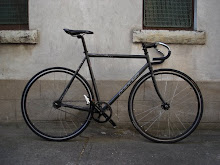According to a few (or many?) non-cyclists out there cycling is dangerous, a drain on our economy, and bad for business. Though I can name off all the benefits to cycling I want to look at some of the common “facts” that are hurled at against cycling.
Cyclists should ride on the sidewalk not the road.
It’s called a sidewalk and not a sidebike for a reason. Under the Ontario Highway Traffic Act bicycles are vehicles and must ride on the road. In addition, Studies have shown it’s safer to ride on the road rather than on the sidewalk. By having a cyclist ride on the sidewalk they increase their chances of being involved in a collision with a vehicle or a pedestrian (and why should we pass the burden of risk to pedestrians?).
Cyclists don’t deserve to be on the road because they don’t pay taxes.
Everyone pays taxes. Income taxes, taxes on goods/services, property taxes, etc. I don’t see how cyclists are able to avoid paying them (do cyclists have a tax exemption card?). Besides, municipal roads are paid for through municipal revenues which come from property taxes. Gas taxes, vehicle registration taxes, and parking tickets do NOT pay for roads. Though 2 cents per litre in Ontario will go to road repair/construction, which can easily be considered revenue neutral (‘ish) to pay for road damages caused by cars. Roads are public, are paid for and used by everyone regardless of what mode of transportation they use.
Cyclists ignore the law, they don’t deserve any rights.
Yes, I will admit that there are cyclists that ignore the rules of the roads to the dismay of drivers and real cyclists alike. However, cyclists are NOT the only one known for ignoring the rules of the road; drivers and pedestrians are just as guilty. Now it’s easy for anyone to claim that one type of road user is worse at it, for example: drivers never check blind spots when they turn, they speed, run red lights, park in bike lanes, etc. Cyclists on the other hand run red lights and stop signs, ride on the sidewalk/street whenever it’s convenient, don’t signal when turning, etc. Though this is what some drivers and some cyclists do this is not true for the rest of them. It is an over-generalization.
Cyclists shouldn’t be on the roads because they are slow and clog up the streets.
Compared to a vehicle a bike is slow, however, if you pit the bike in a downtown city versus a car and have both travel somewhere within 5 miles or less, chances are the bike will win. Bikes have the bonus of being able to bypass idling vehicles at intersections and are sometimes exempt from turning restrictions on roads (or they can walk their bike across the intersection to make a left turn where vehicles normally would not be allowed to).
A bike only occupies a fraction of the space in a lane than a car would and in most cases a car and bike can fit in a lane safely. One bike on the road means one less car. This means that there will be one less car contributing to grid lock, one less car in your way so you can make that yellow light at an intersection, one less car taking up the few parking spots downtown, one less car slowing you down on the road.
Cycling in the winter is crazy and should be banned.
A lot of fears and negative expectations of riding in the winter are quite silly. If anything, I would say most common winter activities are crazy. How is bombing down a hill wearing pieces of wood while carrying pointy sticks with obstacles in your way considered a normal winter activity? How can one justify strapping on metal blades on their feet and go gliding across a rink of ice wielding a stick while bashing others? How is it that operating a human-powered vehicle equipped with brakes, steering mechanism and rubber tyres for traction is crazy? I also have to ask, how many cycling deaths were in some way the result of winter conditions? I think in the past 5 years we've only had 1 and it was out in Quebec.
Cyclists are always at fault when they are involved in a collision.
Cyclists are not as protected from collisions as drivers are; they have no air-bags, seatbelts, or metal cage to protect them so it’s only natural for them to develop an understanding of the risks of careless riding. That being said, a study by the UK government concluded that careless cycling were the result of only 2% of serious injury with another vehicle and there are several other sources from many other countries that back similar findings.
Cycling is not the answer to solving climate change/congestion/whatever other issue.
I can agree with this statement. It is unfeasible to think that the future of transportation lies in cycling; people with mobility issues are at a disadvantage and so those who need to transport very heavy goods across long distances. I do, however, believe that it is part of the solution. Our transportation needs cannot be met by cars alone, nor can it be met by buses, LRT, or subways alone. To use the idiom “Don’t put all your eggs in one basket”, we must realize that we have to diversify our transportation options and integrate them together to reduce congestion and our dependency on cars. So bikes may not be the answer, but they are certainly part of it.
I feel like this post is like preaching to the choir since only cyclists would read cycling blogs and chances are they already know this stuff.
In case anybody asks for sources:
http://ogov.newswire.ca/ontario/GONE/2006/02/06/c4218.html?lmatch=%E3%80%88=_e.html
http://www.vehicularcyclist.com/hta1.html
http://www.toronto.ca/cycling/bikewinter/index.htm
http://www.guardian.co.uk/lifeandstyle/2009/dec/15/cycling-bike-accidents-study
Subscribe to:
Post Comments (Atom)


1 comment:
"I feel like this post is like preaching to the choir since only cyclists would read cycling blogs and chances are they already know this stuff. "
Haha I was thinking this as soon as I started reading it. Still, a well written post.
Post a Comment